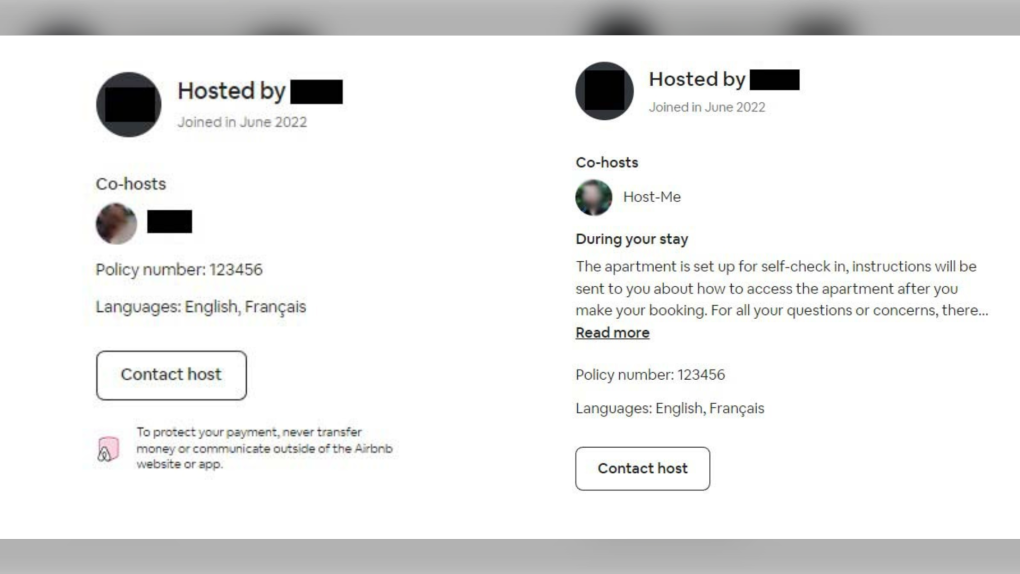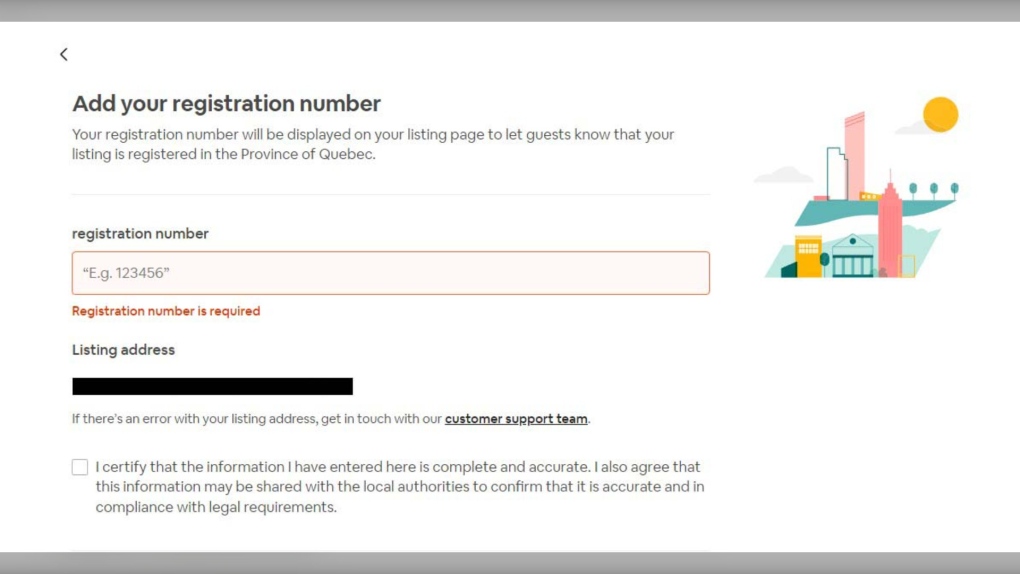123456: Are Quebec Airbnb hosts faking permit numbers to skirt new regulations?
Just a week after Airbnb tightened regulations for Quebec listings following a deadly fire, hosts may already be bending the rules.
Airbnb now requires its hosts to provide a six-digit policy number with their listing, obtained when a tourist lodging is registered with the provincial government.
But a scroll through the Airbnb website suggests users are falsifying their permit numbers to sneak past the authentication process.
For example, CTV News found at least five listings by the same host containing the policy number 123456. These listings were for units in various locations.
 Two Montreal Airbnb listings at distinct locations, ran by the same host but different co-hosts, list 123456 as their policy numbers. Multiple other listings by the host include this number as well.
Two Montreal Airbnb listings at distinct locations, ran by the same host but different co-hosts, list 123456 as their policy numbers. Multiple other listings by the host include this number as well.
In fact, Airbnb uses 123456 as an example when prompting prospective hosts to enter their policy numbers.
 Airbnb uses the numer 123456 as an example when prompting Quebec users to enter their policy number.
Airbnb uses the numer 123456 as an example when prompting Quebec users to enter their policy number.
In another instance, two separate establishments that appear to be run by different hosts shared the same registration number of 299398.
Cédric Dussault, spokesperson for Quebec housing advocacy group RCLALQ, said he's come across similar discrepancies on the platform.
"It's clear that there's no crosschecking whatsoever," he alleged in an interview with CTV News.
"There are some users that have a registration number for one location, but they are using the same one for various locations."
Quebec law requires each tourist establishment to have its own registration number. To get this number, applicants must share proof of compliance with municipal laws, photos of the residence, and proof of civil liability insurance.
Until recently, Airbnb didn't require users to input their permit numbers when creating a listing. As a result, many of the accommodations on the site were unregistered -- including a handful of units inside a building in Old Montreal.
But when that building burned down earlier this month, killing seven -- many of whom were tourists -- the City of Montreal pressured Airbnb to tighten up its rules.
On Tuesday, Airbnb removed all Quebec listings without a permit number from its platform.
But Dussault believes this move is a "PR operation."
"Don't be fooled by the public discourse by Airbnb, they perfectly know what they're doing," he alleged.
When asked whether a system was in place to confirm the validity of permit numbers, Airbnb said the responsibility lies with the Quebec government.
"The Province issues the CITQ [Corporation de l'industrie touristique du Quebec] number directly to Hosts, not Airbnb. As such, it's the Province's responsibility to enforce their legislation. We have offered the City Portal to the Province," reads a statement from the company.
The City Portal tool allows participating municipalities to "view Airbnb listings within their registration systems" and offers "tools to help enforce their laws," according to the Airbnb website.
Quebec's Tourism Ministry has yet to respond to a request for comment.
A spokesperson for Montreal Mayor Valerie Plante's office responded that "firm respect for the law must be enforced on all platforms if we want to recover the illegal housing that deprives Montrealers of a home."
Last week, the Plante administration announced it would form a team of investigators tasked with cracking down on illegal short-term rentals by June.
CTVNews.ca Top Stories

Canadian team told Trump's tariffs unavoidable right now, but solutions on the table in surprise Mar-a-Lago meeting
During a surprise dinner at Mar-a-Lago, representatives of the federal government were told U.S. tariffs from the incoming Donald Trump administration cannot be avoided in the immediate term, two government sources tell CTV News.
Pedestrian killed by Via Rail train near Kingston, Ont.
Regular rail traffic has resumed with severe delays.
Muskoka reacts to major snowfall, hundreds stuck on Highway 11
From road closures, power outages, weather declarations and nonstop shovelling, Muskoka residents were faced with nearly a metre of persistent snowfall on Saturday.
Saskatoon priest accused of sexual assault says he meant to encourage young girl with hug and kiss
A Saskatoon priest accused of sexual assault says he meant to encourage and reassure a young girl when he hugged and kissed during his testimony at Saskatoon Provincial Court Friday.
Beef prices reach record highs in Canada
The cost of beef continues to rise, reaching record highs on grocery store shelves ahead of the busiest time for many grocers and butchers before the holiday season.
Trump threatens 100% tariff on the BRIC bloc of nations if they act to undermine U.S. dollar
U.S. president-elect Donald Trump on Saturday threatened 100 per cent tariffs against a bloc of nine nations if they act to undermine the U.S. dollar.
Bob Bryar, drummer for rock band My Chemical Romance, dead at 44
Bob Bryar, former drummer for the band My Chemical Romance, has died. He was reportedly 44.
Toronto man accused of posing as surgeon, giving four women injections
A 29-year-old Toronto man has been charged after allegedly posing as a surgeon and providing cosmetic procedures on several women.
'Disappointing': Toronto speed camera cut down less than 24 hours after being reinstalled
A Toronto speed camera notorious for issuing tens of thousands of tickets to drivers has been cut down again less than 24 hours after it was reinstalled.


































